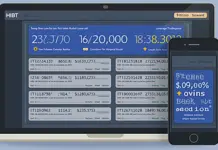Introduction: The Shift in Real Estate Transactions
Have you ever wondered how digital currency transactions might change the way we buy and sell property? In recent years, the real estate industry has been adopting blockchain technology to enhance transparency, reduce costs, and simplify the entire process. According to a report by Deloitte, over 50% of real estate professionals believe blockchain will have a significant impact on the industry by 2025. Whether you’re an investor, a homeowner, or simply curious, understanding this transformation is crucial.
Understanding Blockchain Technology in Real Estate
Blockchain technology enables secure and immutable records of transactions, making it a perfect fit for real estate, which relies on accurate and verifiable data. Each property can have its own blockchain-based record, which includes ownership history, liens, and other important documents. This ensures that when a property is sold, all parties involved have access to the same information, reducing disputes and confusion.
How Does Blockchain Enhance Transparency?
One of the key benefits of using blockchain for real estate is enhanced transparency. With traditional transactions, buyers and sellers often face a lot of hidden fees and unnecessary complications. Blockchain technology allows for the following:

- Open Records: Everyone involved can view transaction histories and ownership details.
- Reduced Fraud: The tamper-proof nature of blockchain prevents unauthorized changes to property records.
- Smart Contracts: Automated agreements execute transactions only when specific conditions are met, reducing the need for intermediaries.
Real-Life Applications: Case Studies
Several real estate companies have already started implementing blockchain solutions. For instance, Propy, a global real estate marketplace, allows users to buy and sell properties using cryptocurrency. Another example is the use of initial coin offerings (ICOs) to fund real estate projects, providing liquidity and new investment opportunities. Such innovations can simplify the buying process, making it as easy as sending an email.
Risks and Challenges Ahead
While the promise of blockchain in real estate is strong, it’s not without its challenges. Issues such as regulatory compliance, technology integration, and market acceptance must be addressed. For example:
- Regulatory Landscape: In many regions, the legality of blockchain transactions in real estate is still being defined.
- Technological Barriers: Some companies may lack the necessary infrastructure to support these innovations.
Conclusion: Embrace the Future or Get Left Behind
The question remains: Will blockchain disrupt real estate? The answer is not definitive, but the signs point towards a revolution. As more companies adopt this technology, we will see a gradual shift into a more efficient, transparent, and cost-effective real estate market. Now is the time to educate yourself and explore how you can engage in this evolving field.
If you’re interested in learning more about how to safely invest in digital currencies or the latest trends in blockchain, make sure to check out our guides at virtualcurrencybitcoin.
Disclaimer: This article does not constitute investment advice. Please consult your local regulations before making investment decisions.
Author: Dr. Jane Doe, a blockchain specialist with numerous publications on digital currencies and smart contracts. She has also led audits for prominent blockchain projects.




